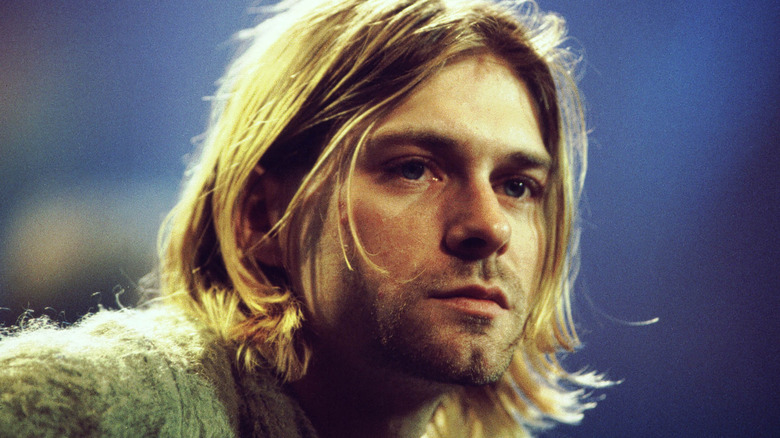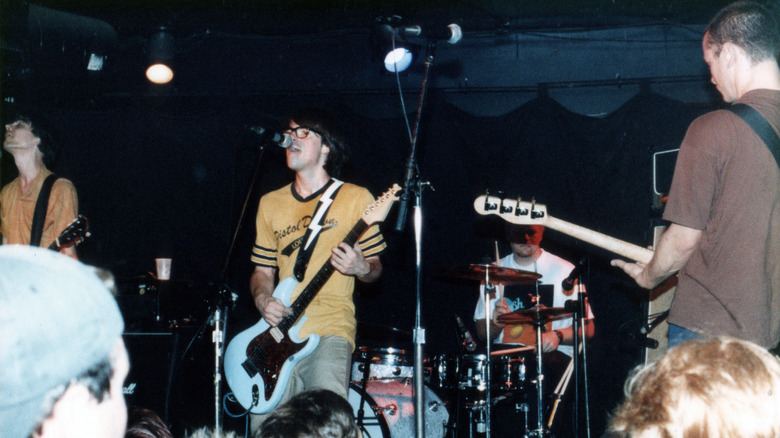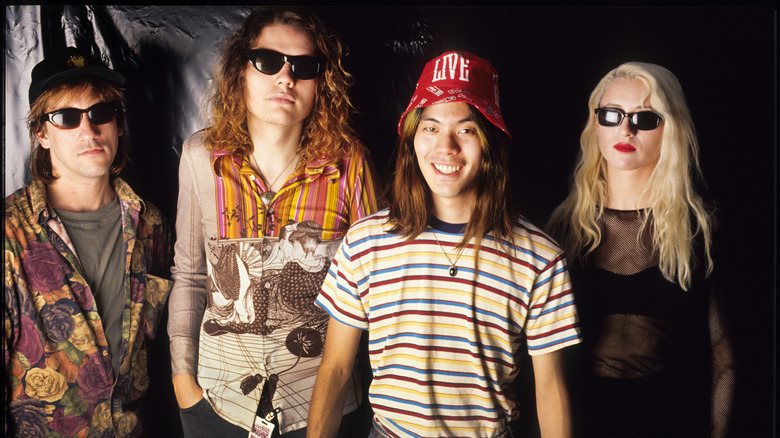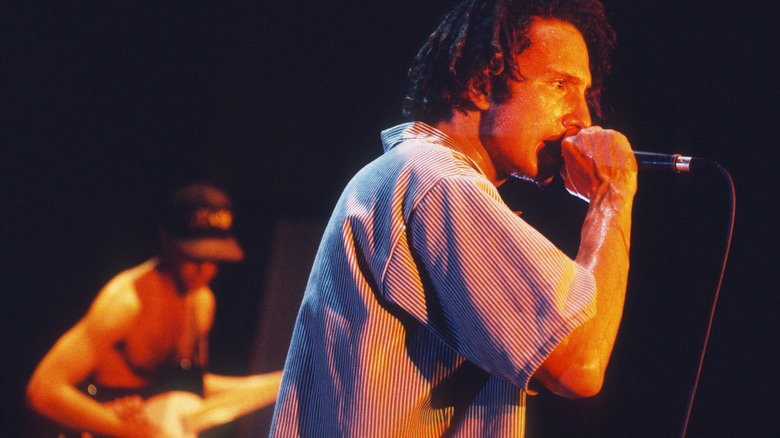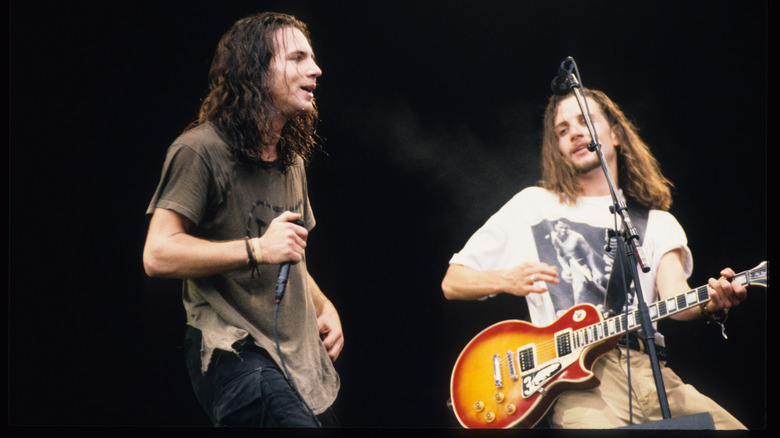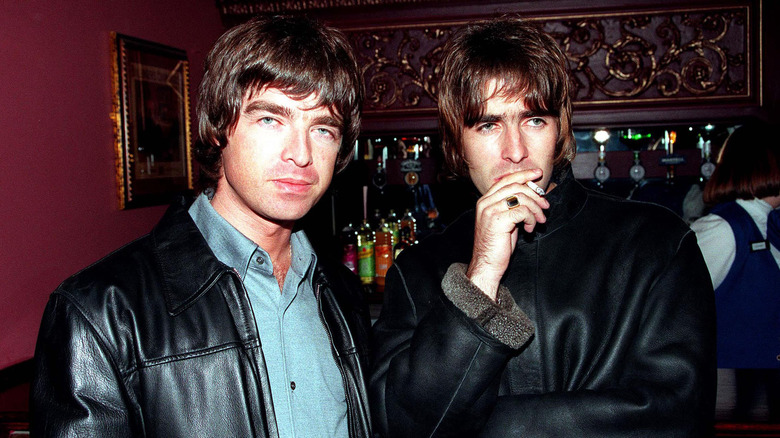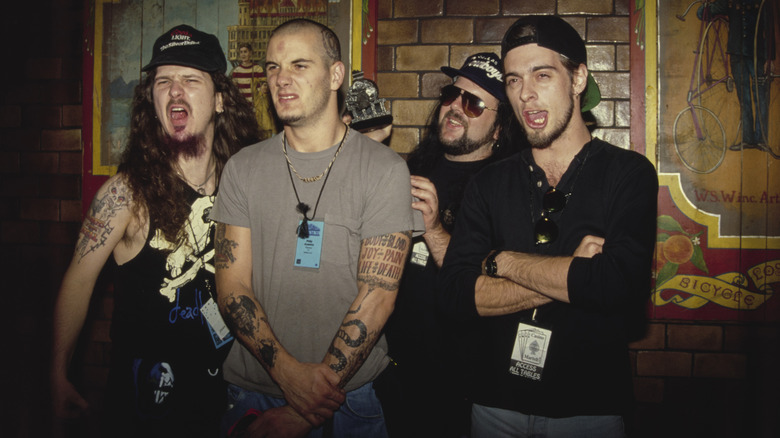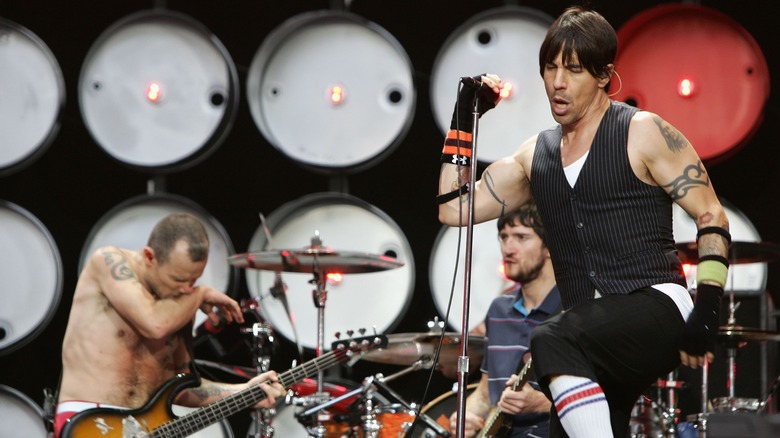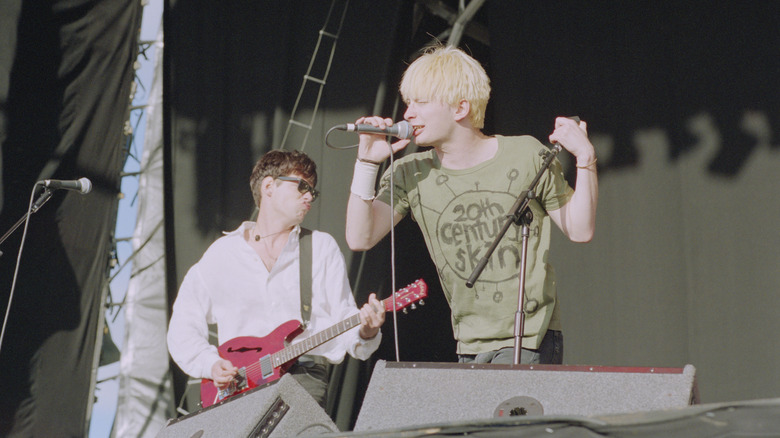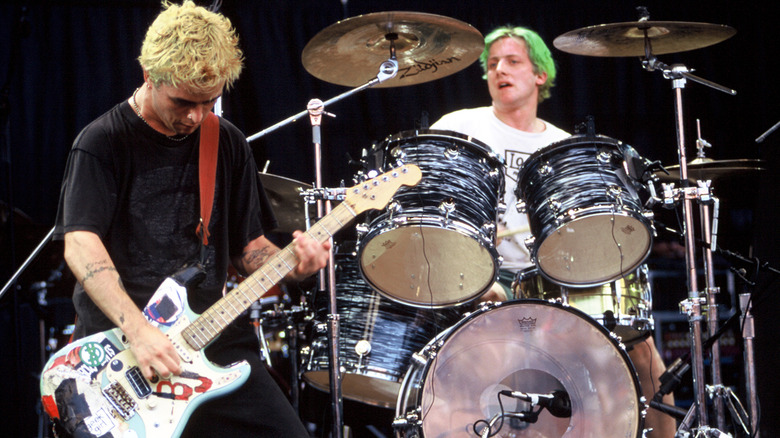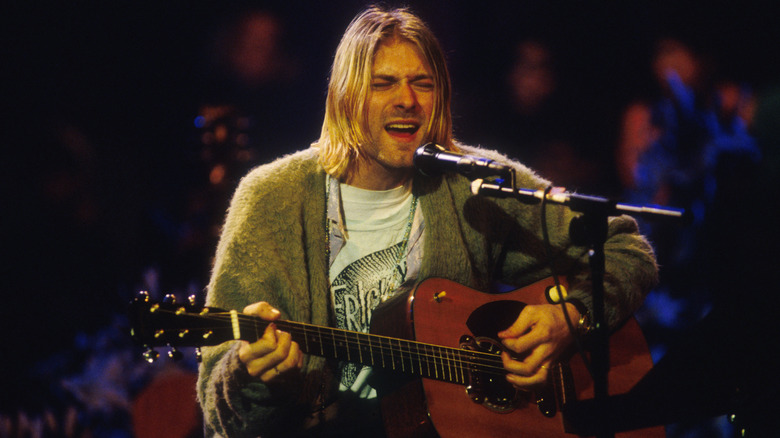Most Important Rock Bands Of The 1990s
We're on the downslide now. Rock music peaked in the '60s with The Beatles, The Rolling Stones, and Jimi Hendrix. It remained wildly popular throughout the '70s, thanks to Led Zeppelin, Queen, and Pink Floyd, and groups like Guns N' Roses, U2, and Van Halen carried the torch with pride into the next decade. But it was sharing more and more of the charts with other genres by that point. In the '90s, the sound of youthful rebellion would have firmly transitioned to rap and hip hop.
But that doesn't mean rock music was down for the count. The '90s still produced plenty of classics and influential legends. There were so many important bands, in fact, that many worthy ones — from Limp Bizkit to Marylyn Manson to Nine Inch Nails, Blur, the Offspring, Rancid, and Stone Temple Pilots, simply couldn't fit on this list.
But the bands that did make the cut are some of rock's last giants. From Nirvana to Weezer to Oasis and the Red Hot Chili Peppers, these are the most important rock bands of the '90s.
Weezer
If any band was destined to serve as the bridge mainstream rock audiences would cross from the dark pit of angsty early '90s grunge to the brighter, less serious era of late '90s pop rock, it was Weezer. In its examination of the group's legacy, Passion Weiss claims the group's 1994 debut, "Weezer," also known as "The Blue Album," had everything such a bridge could theoretically require. It had all the heart and angst audiences were, by that point, well accustomed to, but it also featured a sillier side that served to remind listeners that it's actually okay to have fun, and that sadness and pain aren't the only authentic human experiences worth writing songs about.
The band would continue to experiment and stretch itself to find the edges of its own capabilities with albums like 1996's "Pinkerton." But the elements that make Weezer such a depandable listen all these years later were there from the beginning. The sadness. The goofiness. The self-aware, smirking winks. The "Say It Ain't So" and "Buddy Holly" rockers might've sullied their once-promising reputation with more than their fair share of middling material since then, but their legacy remains. And that's part of the story, too. Weezer has a lot of things to say, and it's like they're telling their fans, "Hey, we're still figuring it all out, just like you. Some stuff works, some stuff doesn't." Maybe what Weezer is more than anything else, is a band trying to just be human, instead of larger than life.
Korn
Say what you will about Nu Metal — the often disparaged metal-slash-hip hop fusion that dominated the world of mainstream rock in the late '90s. Limp Bizkit certainly added a, uh, let's say punchable quality to the genre. But when dreadlock-sporting Korn first hit the scene with their eponymous 1994 debut album, nobody had ever heard anything like it.
In fact, you could make an argument that the dudes behind "Follow The Leader," their 1998 smash hit record, were some of the last major rock stars. According to The Ringer, the band was as popular as Britney Spears and NSYNC at the time, and certain cuts off the album had to be retired because they were so frequently requested.
But to truly gauge their importance, you'd have to look at their impact. Nobody sums it up better than the group's long-term guitarist, Brian "Head" Welch. "I look at who came after us, and bands really took our sound and did amazing things with it," he told Metal Hammer (excerpted in PRP). "Look at Slipknot and look at Linkin Park! I love both those bands, and they took what we did into whole new directions ... You have to think that's an accomplishment!"
Smashing Pumpkins
The early '90s were dominated by the angsty yarling of grunge (via Britannica). The Smashing Pumpkins laced their music with pain, too, but always with more introspection that turned their musings into something beautifully strange (via AllMusic). But just because they never quite fit in with the Seattle lumberjack crowd and didn't really hit their commercial stride until after grunge faded, with 1995's "Melon Collie and the Infinite Sadness," doesn't mean you should discount their influence on some of the decade's most important bands.
Their debut, "Gish," actually influenced early Grunge stalwarts rather than the other way around. In an interview with Rolling Stone, singer Billy Corgan was asked whether he thought the breakout success of Nirvana's "Nevermind" and Pearl Jam's "Ten" a few months after its release led to "Gish" being unfairly dismissed. "People have tended to diminish the influence of the record," he said. "I remember having a conversation with [Pearl Jam frontman] Eddie Vedder ... He told me how much of an influence Gish was on their first record. And through the years, I've talked to many, many people who really pointed to Gish as the game-changer in their mind about how to approach guitar and how to record."
Maybe it's for the best that they didn't get their day in the sun until after grunge died out. They always offered something a little different, a little more dream-like — and when they finally got their break, the world was finally ready to appreciate it in all its inimitable, beautiful weirdness.
Alice In Chains
Grunge is often credited with killing hair metal and making it instantly uncool to sport theose bands' merch in public. And that's true, but the baby actually survived when the bathwater got dumped. Legacy groups like Metallica and Guns N' Roses survived the culling, and bands rightfully considered to be a part of the alt-rock explosion ushered in by the Seattle sound took plenty of influence from what came before.
Alice in Chains, for example, had a heavy metal edge and long locks reminiscent of the previous era, not to mention one of the last great singer-guitarist duos in rock history in frontman Layne Staley and backup-singer-slash-guitarist (and current band leader) Jerry Cantrell. On paper, the "Man In The Box" and "Rooster" rockers were a product of a classic era, somehow playing alongside bands defined by their rejection of everything that came before. In another sense, they were nothing like anything they appeared to imitate. Their lyrics weren't about partying or fast cars or loose women or how rock n' roll would save the world. They had no time for that kind of corniness. They sang about a type of pain only people who were intimately familiar with loss and addiction could possibly understand (via Loudersound). Maybe that made them something of a bridge.
Like their contemporaries, Alice got too big, too fast for their own good, and they turned to drugs to deal with the pressure. The consequences were predictably tragic (via Rolling Stone), but never undid the band's haunting, towering legacy.
If you or anyone you know is struggling with addiction issues, help is available. Visit the Substance Abuse and Mental Health Services Administration website or contact SAMHSA's National Helpline at 1-800-662-HELP (4357).
Rage Against The Machine
Rage Against The Machine is understandably lumped in with the other rap-rock and metal groups that popped up in the late '80s and '90s, from the Beastie Boys to Limp Bizkit. But maybe "punk" is the most appropriate label for perpetually furious singer Zach De La Rocha, experimental guitar wizard Tom Morello, and the other members of the band. That's not to say "Bulls On Parade" or "Killing In The Name" sound anything like The Sex Pistols or Black Flag. But man, do they have punk attitude and energy in spades. How else would you describe a group that's spent its entire career lobbing sonic grenades at the political establishment (or really any authority figure) and getting the masses riled up into a revolutionary frenzy (via Rolling Stone)?
Loudersound claims that Rage's breakthrough challenged assumptions that Generation X, then young kids consuming rock, were a bunch of disillusioned, directionless slobs who cared about nothing. Rage cared. Rage wanted you to care. Rage crafted an explosive cocktail of diverse influences and anti-authoritarian lyrics and went on the attack with a snarling, impassioned, get-with-us-or-get-out-of-the-way attitude. These guys had no time for games, only musical anarchy hurled at everything from Big Business to abusive cops to income inequality, racism, and nearly all other forms of unfairness and injustice. People get understandably sick of getting lectured by self-righteous celebrities, but Rage wasn't lecturing. They were sticking it to the man. What's more rock n' roll than that?
Pearl Jam
Although its major acts would continue to play for years, the grunge era arguably ended with Kurt Cobain's 1994 death. Then, other legends met tragic, premature fates. Layne Staley of Alice In Chains passed in 2002 from a drug overdose, according to Rolling Stone. In 2015, drugs also killed Stone Temple Pilots and Velvet Revolver frontman Scott Weiland (via Rolling Stone), and in 2018, Soundgarden legend Chris Cornell took his own life (via Billboard). They certainly didn't want to earn the accolade this way, if they were seeking it at all, but that leaves Pearl Jam as the last grunge titan standing.
But maybe they were always going to outlast their peers in some way. Adam Graham over at Detroit News calls them essentially the dads of rock and says that the ingredients for their longevity were there from the beginning, before anyone could recognize them for what they were.
In a nutshell, the "Alive" and "Even Flow" rockers, long fronted by humble servant of music Eddie Vedder, kept it simple, avoided the tabloid-grabbing shenanigans that derailed their peers, and kept their eye on the prize: whatever album or tour lay ahead. They never tried to be rock stars, in other words, but simply the best musicians and performers they could be. In that way, they because some of the best rock stars around.
If you or anyone you know is struggling with addiction issues, help is available. Visit the Substance Abuse and Mental Health Services Administration website or contact SAMHSA's National Helpline at 1-800-662-HELP (4357).
If you or anyone you know is having suicidal thoughts, please call the National Suicide Prevention Lifeline at 1-800-273-TALK (8255).
Oasis
For Business Insider, Matthew DeBord claims that Oasis were the greatest British band since Led Zeppelin. That's high praise indeed. Certainly, Queen, Pink Floyd, and The Clash would like a word.
But DeBord draws some convincing parallels between the legendary British stadium rockers of the '70s and the brother-fronted, mid-'90s Britpop sensation. Both were mesmerizing live acts, he claims. Both knew how to not only write great music, but how to perfectly arrange it in album form. Both Robert Plant and Liam Gallagher defined what rock frontmen looked like for their respective eras and have been imitated endlessly ever since. There's plenty more in the article, but you get the point: Oasis were indeed one of the most important bands in music in the post-hard rock, post-grunge era, and one of the greatest British rock n' roll exports of all time. At their peak, they were almost certainly the best band on the planet.
Kim Taylor Bennett argues as much for Vice while talking to the director of "Supersonic," a documentary about the famously dysfunctional but undeniably brilliant Gallagher brothers who fronted the group. "There's something about them," director Matt Whitecross said. "It's not just a nostalgic thing. There's a kind of don't give a f**k punk spirit to those guys that was unique and is such a great antidote to the times that we live in where people are a lot more respectable. The last thing you want is for rock 'n' roll to get too respectable."
Pantera
Britannica says heavy metal was one of the dominant forms of popular music in the '80s, thanks to hair metal bands like Poison and Mötley Crüe. But with the '90s came grunge, and glam metal superstars who used to pack stadiums found themselves playing clubs. Even legends like Metallica and Judas Priest, scrambling for relevance, tried to switch things up only to put out the most embarrassing material of their careers (via Loudersound). There were some fresh ideas getting tossed around, but the budding death metal and black metal genres were a bit too extreme to shoulder the whole genre.
Luckily for headbangers, there was Pantera. The Texan groove metal fourpiece flew the metal flag high and ultimately proved to be exactly the shot in the arm heavy music needed in a rough decade. Their 1990 breakthrough record "Cowboys From Hell" set them on a path to glory, but Kerrang! says it was their 1992 album "Vulgar Display of Power," spearheaded by all-time classic "Walk," that truly changed the game.
For the rest of the decade, scowling, menacing Phil Anselmo and shredding legend "Dimebag" Darryl Abbot, supported by one of the thickest, gnarliest rhythm sections ever with Rex Brown on bass and Dimebag's brother Vinnie Paul behind the kit, were an unstoppable metal assault. Sadly, addictions and infighting led to their 2000 breakup (per Blabbermouth), and Dimebag's shocking onstage murder (via Rolling Stone) and Vinnie's 2018 death (via USA Today) shut the door on a reunion for good. But their legacy stands tall.
If you or anyone you know is struggling with addiction issues, help is available. Visit the Substance Abuse and Mental Health Services Administration website or contact SAMHSA's National Helpline at 1-800-662-HELP (4357).
Red Hot Chili Peppers
We usually judge the greatness of an artist by the number of imitators they produce. But honestly, who's even trying to sound like the Red Hot Chili Peppers? They're arguably the first and only notable band in the alt-punk-funk-rap-rock space and have been since their mid-'80s inception. Sure, John Frusciante wasn't named the greatest guitarist of the last thirty years (per Gigwise) for nothing. But if any bands who do a great RHCP impression have played venues bigger than the nearest Applebees, the wider public has yet to meet them. That's not a slight against the Chili Peps, by the way, but simply an acknowledgment that they so thoroughly dominate the little corner of the musical world they've carved out for themselves that nobody else even wants to try.
So let's propose a new metric to judge greatness by: longevity. Most bands who stay relevant for decades have to weaponize nostalgia to do so. But according to Britannica, the Chili Peppers have enjoyed three separate, legitimate commercial peaks, each taking place in a completely different musical world. The first was their 1991 breakthrough record, "Blood Sugar Sex Magik," which produced hit singles "Under the Bridge" and "Give It Away." Then came 1999's "Californication," spearheaded by the title track, and then 2006's monster double-album "Stadium Arcadium," with classics like "Dani California," "Snow (Hey Oh)" and "Desecration Smile."
Their sound doesn't produce many copycats, but it apparently doesn't age, either.
Radiohead
Scout says that after Kurt Cobain's death, British alt-rock up and comers Radiohead were expected to fill the void Nirvana had left behind. That's an outrageous amount of pressure to put on anyone, given the degree to which Nirvana had changed everything. But while the Thom Yorke-fronted Radiohead never quite reached the same levels of commercial success, they came admirably close and arguably surpassed the Seattle grunge trio when it came to twisty, forward-thinking experimentation. They were a pop rock band, sure, but this was a ruse. They simply used hooks to pin your defenses in place before slipping around them to engage you on a deeper level.
If you want to know what they were really all about, NME says they took the royalties a lesser act would've blown on blow and spent it on a brand new studio setup instead. They didn't just fill it with standard equipment, but with all sorts of devices that would help them achieve the experimental art-rock tone they were starting to become notable for. Their resulting third album wasn't just something different and fresh. It was 1997's "OK Computer."
Listed as the 42nd greatest album of all time by Rolling Stone (a list which includes multiple other records from the group) and spearheaded by singles "Paranoid Android," "Lucky," and "Karma Police," "OK Computer" changed the nature of the rock album and inspired countless bands swimming in their wake to push themselves further to discover the edges of their creative ability.
Green Day
If '80s hair metal was a giant, decade-long party, then early '90s grunge rock was the hangover. Sick of all the spandex, Aquanet, and Cherry Pie, audiences turned to angsty Seattle lumberjacks who sang about the dark side of rock n' roll. But that got old too, and by the middle of the decade, the hangover had run its course. Having hurled for the last time, audiences were more than ready to have some fun again.
Luckily, punk rock was on the rebound, spearheaded by SoCal bands like Green Day. Singer-guitarist Billie Joe Armstrong, bassist Mike Dirnt, and drummer Tré Cool combined bona fide rebellious punk angst with something few of their peers had: world-class songwriting talent that transcended the scene. You can hear it in spades on "Basket Case," "Longview," "When I Come Around," and every other track on 1994's smash hit "Dookie," which Pitchfork gave a glowing review and described as a fresh blast of timeless, hook-filled, punk classics.
The band were now superstars. They lost a bit of their edge by the end of the decade, but resurfaced for a new generation with 2004's era-defining "American Idiot," one of the best modern rock albums ever made (per Rolling Stone). The National News claims their mainstream success earned them plenty of enemies within the scene, who claimed they sold out. Thankfully, they damned those torpedoes and kept delivering some of the best pop punk anthems ever written, eventually establishing themselves as beloved elder statesmen of rock.
Nirvana
It's been said a million times before that the opening power chords of "Smells Like Teen Spirit" transformed the music world in an instant. All of a sudden, according to the BBC, the hair metal that dominated the previous decade sounded embarrassing and dated. Poison and Winger shirts vanished overnight, leaving only the biggest hard rock and metal acts of the previous era commercially viable. The song also blew the doors off alternative music, and ushered the '90s — from the songs to the fashion — into the forefront of culture.
The "Seattle sound," also known as grunge — characterized by rough musicianship, angstry, emotional lyrics about pain rather than partying, and lumberjack costumes, was now in style. It wouldn't be for long. The genre, never built for mainstream acceptance in the first place — fell out of favor shortly after Kurt Cobain's tragic death by suicide in April 1994. But by that time, Nirvana's "Nevermind," filled with era-defining, still-modern sounding alt rock hits like "Come As You Are," "Lithium," and "In Bloom," had already changed the world.
"I bought Nevermind," wrote the Stooges' Iggy Pop for Rolling Stone, "and I thought, 'This has really got it' ... They rocked without rushing and they managed melody without being insipid. It was emotional without sounding dated or corny or weak." About Cobain himself, Pop continued, "Somebody who is truly nobody from nowhere reached out and touched the world. He may have touched it right on its wound."
If you or anyone you know is having suicidal thoughts, please call the National Suicide Prevention Lifeline at 1-800-273-TALK (8255).
